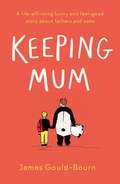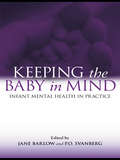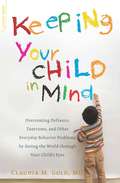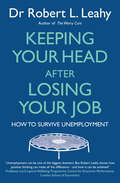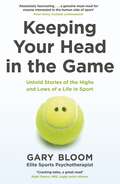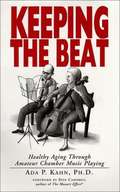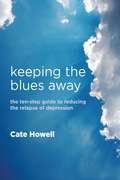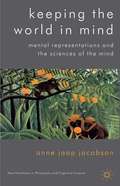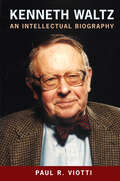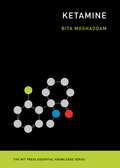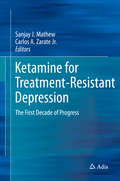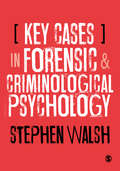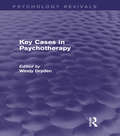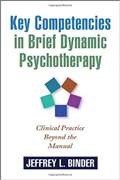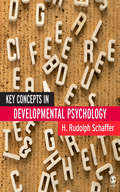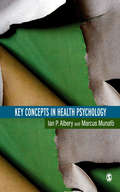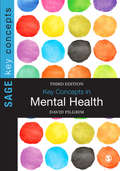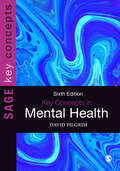- Table View
- List View
Keeping Mum: A life-affirming funny and feel-good story about fathers and sons
by James Gould-BournCHOSEN FOR DAILY MAIL'S BOOKS OF THE YEAR 2020'Touching and often hilarious... A truly joyful read'Press & Journal**********Danny Malooley's life is falling apart.He's a single parent with an eleven-year-old son, Will, who hasn't spoken since the death of his mother in a car crash fourteen months ago. He's being pursued by a dodgy landlord for unpaid rent and he's just lost his job. Struggling to find work, and desperate for money, Danny decides to do what anyone in his position would do. He becomes a dancing panda.After seeing street performers in his local park raking it in, he spends his last fiver on a costume... but the humiliation is worth it when Will finally speaks to him for the first time since his mother's death. The problem is Will doesn't know that the panda is in fact his father, and Danny doesn't want to reveal his true identity in case Will stops talking again. But Danny can't keep up the ruse forever...**********'Uplifting'Woman & HomeA surprising, laugh-out-loud and uplifting story of a father and son reconnecting in the most unlikely of circumstances. For fans of Nick Hornby, Mike Gayle and Jojo Moyes.
Keeping The Baby In Mind: Infant Mental Health in Practice
by Jane Barlow P. O. SvanbergKeeping the Baby in Mind builds on the expanding evidence pointing to the crucial importance of parents in facilitating their baby’s development, and brings together expert contributors to examine a range of innovative psychological and psychotherapeutic interventions that are currently being used to support parents and their infants. It not only provides an overview of the many projects that are now available but also makes recommendations for future practice and the way in which children’s services are organised. The book brings together interventions and ways of working that can be used both universally to support parents during the transition to parenthood, and with high-risk groups of parents where for example there may be child protection concerns or parents experience severe mental health problems. Each chapter describes the evidence supporting the need for such interventions and the approach being developed, and concludes with a description of its evaluation. Keeping the Baby in Mind marks a new and exciting phase in the development of interventions to support infant mental health and will be of interest across a wide range of disciplines from primary and community care to early years and Children’s Centre settings.
Keeping Your Child in Mind: Overcoming Defiance, Tantrums, and Other Everyday Behavior Problems by Seeing the World through Your (A Merloyd Lawrence Book)
by Claudia GoldBeing understood by someone you love is one of the most powerful feelings, at all ages. For a young child, it is the most important of all experiences because it allows the child’s mind and sense of self to grow. In the midst of the perennial concerns parents bring to Dr. Claudia Gold, she shows the magical effect of seeing a problem from their child’s point of view. Most parenting books teach parents what to do to solve behavior problems, but Dr. Gold shows parents how to be with a child. Crises are defused when children feel truly heard and validated; this is how they learn to understand, and, eventually, control themselves. Dr. Gold’s insightful guide uses new research in developmental psychology and vivid stories from her practice to show parents how to keep a child in mind and deepen this central relationship in their lives.
Keeping Your Head After Losing Your Job: How to survive unemployment
by Dr Robert L. LeahyAlthough the current economic crisis creates a sense of urgency, we have always had and will always have a large number of people who are unemployed. For many, it is the most difficult time that they have ever faced. Without help, the unemployed face an increased risk of binge drinking, depression, anxiety and suicide. For many, there is a decreased quality of mental health, life satisfaction and objective physical wellbeing. Most feel alone and helpless.Dr Robert Leahy has worked with many unemployed people over the years, examining the psychological consequences of unemployment and exploring ways to help people cope with the emotional fallout of losing their job. This book gives readers psychological tools to handle their period of unemployment and simple, self-help strategies that can be used immediately to help them feel better and act better. The book draws on cognitive behavioural therapy (CBT) as well as practices such as mindfulness to help readers boost their self-esteem and confidence, decrease anxiety and feelings of helplessness, and develop resiliance and strength going forward.
Keeping Your Head in the Game: Untold Stories of the Highs and Lows of a Life in Sport
by Gary BloomDrawing on his work with elite athletes, the world's first sports psychotherapist on what to do when life throws you a curveball'Cracking tales, a great read' Nigel Owens MBE, rugby union referee'Absolutely fascinating . . . a genuine must-read for anyone interested in the human side of sport' Peter Drury, football commentatorElite athletes play out their lives in the most public of arenas. Everything they do is analysed in real time and then picked apart in the pub and in the press afterwards. 'Why did they miss that penalty?', 'What made them fall at the first jump?', 'That press conference was a bit weird.' We can all speculate, but what's really going on? In Keeping Your Head in the Game we peer into this highly confidential world. We follow the journeys of ten athletes in their therapy sessions with sports psychotherapist Gary Bloom, from a rugby player arrested for a drunken brawl, through a homesick cricketer on tour, to a snooker player struggling with his feelings of inadequacy and low self-esteem.Structured around the emotions we all experience on a daily basis - shame, anger, fear, jealousy and envy, love - chapter by chapter, the book reveals, explains and attempts to resolve the inner traumas that have an impact on the performance of these sports personalities. Seeing how they overcome their demons is a powerful way of tackling our own and, as Gary says, happier players play better - in sport and in life.'For anyone interested in competitive sport, what people have to do to get to the top and what that can do to the human psyche' Catherine Jackson, journalist and former editor of Therapy Today 'It's amazing how clubs invest in repairing the bodies of their players whilst largely ignoring their minds. Elite athletes are just as fragile as the rest of us. Happily change is on the way and this must-read book will only accelerate that' Jon Champion, football commentator
Keeping a Head in School: A Student's Book About Learning Abilities and Learning Disorders
by Mel LevineA helpful read for a parent or other adult dealing with the challenges of a student affected by learning disorders.
Keeping the Beat: Healthy Aging Through Amateur Chamber Music Playing
by Ada P. KahnDust off your clarinet! You can express yourself and improve your health through music. Ada Kahn's Keeping the Beat encourages older amateur musicians who play violins, cellos, flutes, and recorders to make joyful sounds with others.
Keeping the Blues Away: The Ten-Step Guide to Reducing the Relapse of Depression
by Cate HowellKeeping the Blues Away is a clinically tested programme to help prevent depression from returning: it has also shown efficacy in reducing depression severity. It includes information and exercises to teach coping, cognitive-behavioural and interpersonal skills and strategies to prevent relapses, drawing on a wide array of evidence-based techniques. The ten-step programme aims to support the patient as a whole person, and includes free access to supporting relaxation audio material. The programme is designed for use by GPs or mental health professionals in supporting patients, involving family members or carers where possible, and accommodating medication and the management of co-existing medical problems where necessary. Keeping the Blues Away will be a key relapse prevention tool for primary care healthcare professionals.
Keeping the World in Mind
by Anne Jaap JacobsonThere have been two major models of the mind's relation to its environment in Western though, both of which employ the term 'representation', but in quite different ways. The newer one, dominant today in philosophy, takes the mind to have states about its environment. The older concept, originating with Aristotle but still present in every day speech and in the new sciences of the mind, takes the mind to sample its environment. This book clarifies the old notion, solves some serious problems it faces, and explores the implications for philosophy of an awareness of the view of the mind emerging from cognitive neuroscience. Topics covered include concepts, perception, emotions, beliefs and actions.
Kein Zug nach Nirgendwo: Unstillbares Verlangen ist überwindbar (Edition Centaurus - Psychologie Ser.)
by Siegfried FritzscheDas vorliegende Buch behandelt das gesamte Spektrum der Suchterkrankungen, eingeschlossen auch die sogenannten „modernen Süchte“, die zunehmend ins Blickfeld geraten. Durch ausgewählte Selbsterfahrungsberichte wird dem Leser ein Einblick in die Konfliktsituation und das Leiden der Betroffenen vermittelt. Damit wendet es sich an Betroffene und Angehörige, die sich oft in Rat- und Fassungslosigkeit angesichts des selbstzerstörerischen Verhalten eines ansonsten hoch geschätzten Menschen ansehen. Es beantwortet Fragen nach den Ursachen, Antrieben und Vorboten von Suchtverhalten.
Kenneth Waltz: An Intellectual Biography
by Paul R. ViottiKenneth Waltz (1924–2013) is perhaps the most enduringly influential figure in international relations theory of the second half of the twentieth century. He is considered the father of the structural-realist or neorealist school, and his views on core questions, such as the causes of war and the structure of the international system, are foundational to the field today and likely will remain so for decades to come. Waltz’s writings on both theoretical and policy-related topics, from the balance of power to the spread of nuclear weapons, continue to fuel debate.This book is a groundbreaking intellectual biography of Kenneth Waltz, shedding new light on the development and significance of his key contributions. Paul R. Viotti draws on extensive, candid interviews with Waltz as well as Waltz’s personal files and archival research to provide a nuanced account of the great scholar’s life and thought. He traces the intellectual sources and personal experiences that shaped Waltz’s work, including an intense Lutheran upbringing; service in World War II and the Korean War; and the academic environments of Oberlin College, Columbia University, and the University of California, Berkeley. Viotti examines the key influences on Waltz’s major works, Man, the State, and War and Theory of International Politics, and analyzes their distinctive insights. Engaging with the views of Waltz’s critics and featuring reminiscences from his colleagues, this book is a compelling portrait of an intellectual titan.
Kernel Methods for Pattern Analysis
by John Shawe-Taylor Nello CristianiniKernel methods provide a powerful and unified framework for pattern discovery, motivating algorithms that can act on general types of data (e. g. strings, vectors or text) and look for general types of relations (e. g. rankings, classifications, regressions, clusters). The application areas range from neural networks and pattern recognition to machine learning and data mining. This book, developed from lectures and tutorials, fulfils two major roles: firstly it provides practitioners with a large toolkit of algorithms, kernels and solutions ready to use for standard pattern discovery problems in fields such as bioinformatics, text analysis, image analysis. Secondly it provides an easy introduction for students and researchers to the growing field of kernel-based pattern analysis, demonstrating with examples how to handcraft an algorithm or a kernel for a new specific application, and covering all the necessary conceptual and mathematical tools to do so.
Ketamine (The MIT Press Essential Knowledge series)
by Bita MoghaddamThe emergence of ketamine--previously known as a combat anesthetic and club drug--as a treatment for depression.Ketamine, approved in 2019 by the Food and Drug Administration for the treatment of depression, has been touted by scientists and media reports as something approaching a miracle cure. This volume in the MIT Press Essential Knowledge series chronicles the ascent of a drug that has been around for fifty years--in previous incarnations, a Vietnam-era combat anesthetic and a popular club drug--that has now been reinvented as a treatment for depression. Bita Moghaddam, a leading researcher in neuropharmacology, explains the scientific history and the biology of ketamine, its clinical use, and its recently discovered antidepressant effects, for the nonspecialist reader.
Ketamine for Treatment-Resistant Depression
by Jr. Sanjay J. Mathew Carlos A. ZarateRepresenting the first scholarly compendium of information in the field, this book provides a synopsis of the scientific literature that is equally useful to new and experienced investigators. Recent research in the use of ketamine for difficult-to-treat depressive disorders and related conditions is presented, as is an examination of how insights from these studies are forging new conceptual models of the neurobiology of stress-related affective and addictive disorders, and the nature of treatment-resistance. In addition, the book discusses how ketamine's rapid antidepressant effects provide a scientific platform to facilitate innovation in clinical trial design, including patient selection, choice of control group, outcome measures, and dose-optimization. There is surging worldwide interest in the use of ketamine therapy, and this work collects the insights of many of the world's leading researchers in this nascent clinical and scientific field. This book has appeal to researchers (both clinical and basic), clinicians, health care administrators, and patients. Researchers will benefit from an updated discussion of neurobiological mechanisms and hypothesized actions of ketamine in neural circuits. Clinicians benefit from a clear summary of safety and efficacy data, which will permit informed choices regarding the risk-to-benefit ratio for administration of ketamine to patients.
Ketamine: From Abused Drug to Rapid-Acting Antidepressant
by Kenji Hashimoto Soichiro Ide Kazutaka IkedaThis book presents the latest data from basic research and clinical trials supporting the effectiveness of ketamine as a treatment for depression, bipolar disorder, and suicidal behavior, setting these positive findings within the context of the serious problem of ketamine abuse. The first part of the book focuses on the evidence regarding ketamine abuse, with specific reference to Asian countries, and discusses countermeasures and complication management. It then addresses the mechanisms underlying the antidepressant and side effects of ketamine, which have remained elusive, describing and discussing important new research findings. Further, it explains insights gained from whole brain imaging in rodents and from behavioral pharmacology, and presents evidence regarding the role of gut microbiota, the NMDA receptor GluN2D subunit, and the lateral habenula in the actions of ketamine. These advances form the basis for the safer use of ketamine in patients with treatment-resistant depression and are expected to lead to the development of new antidepressants.
Key Cases in Forensic and Criminological Psychology
by R. Stephen WalshBy presenting current psychological theories alongside individual case studies, this book will guide you to understand the theory as it applies to specific instances of each crime. Covering a wide range of cases, from economic crimes, to terrorism and sexual and violent crimes, this book provides a comprehensive and engaging resource to develop an understanding of forensic psychology.
Key Cases in Forensic and Criminological Psychology
by R. Stephen WalshBy presenting current psychological theories alongside individual case studies, this book will guide you to understand the theory as it applies to specific instances of each crime. Covering a wide range of cases, from economic crimes, to terrorism and sexual and violent crimes, this book provides a comprehensive and engaging resource to develop an understanding of forensic psychology.
Key Cases in Psychotherapy (Psychology Revivals)
by Windy DrydenOriginally published in 1987, the purpose of this book was to show how therapists grappled with cases which challenged their ideas about the theory and practice of psychotherapy at the time, and how they revised these ideas as a result of encountering these cases. The contributors, leading therapists from Britain and the United States, discuss a range of issues – personal, conceptual and technical – that will be of interest to all those engaged in psychotherapeutic work. As such, the book is aimed at those working in psychotherapy counselling, clinical psychology and psychiatry, and at students of these disciplines. It will also have relevance for those with a scholarly interest in developments in the theory and practice of psychotherapy.
Key Competencies In Brief Dynamic Psychotherapy: Clinical Practice Beyond The Manual
by Jeffrey L. BinderThis book identifies the core competencies shared by expert therapists and helps clinicians—especially those providing brief dynamic/interpersonal therapy—to develop and apply them in their own work. Rather than being a cookbook of particular techniques, the book richly describes therapists' mental processes and moment-to-moment actions as they engage in effective therapeutic inquiry and improvise to help patients achieve their goals. The author integrates the psychotherapy and cognitive science literatures to provide a unique understanding of therapist expertise. Featuring many illustrative examples, the book offers fresh insights into how learning and interpersonal skills can be enhanced for both therapist and client.
Key Concepts in Developmental Psychology
by H. Rudolph SchafferPerfect for courses in child development or developmental psychology and arranged thematically in sections corresponding to chapter headings usually found in textbooks, this book is ideal for students wanting an accessible book to enrich their learning experience. Key Features: - Provides an overview of the place of each concept in Developmental Psychology under three headings, namely its meaning, origins and current usage. - Concepts are grouped into sections corresponding to the main themes usually covered in teaching. - Relevant concepts in the book are emboldened and linked by listing at the end of each concept - Guidance is provided to further reading on each of the concepts discussed. The book will be centrally important to undergraduate students who need to learn the language used by developmental psychologists in describing their studies, but will also help more advanced readers in checking their ideas regarding the nature and uSAGE of particular concepts.
Key Concepts in Health Psychology
by Dr Ian Albery Dr Marcus MunafoWhile current textbooks in health psychology offer the reader some conceptual reasoning about different aspects of the discipline, there is no one source which provides an accessible, navigable and cross-referenced analysis of the major models and ideas in health psychology. Key Concepts in Health Psychology provides a `one stop' analysis of key issues, theories, models and methods in contemporary health psychology. It enables the reader to engage with a full range of approaches and methods in the field, and importantly to be able to appreciate the relationships between these.
Key Concepts in Mental Health
by David Pilgrim"This book wins on two levels: not only is there an extensive range of concepts presented (including some that are unexpected yet clearly relevant), there is also a succinct, thorough and critical dissection of each. Recommended, if not essential, reading for all student mental health professionals. " - Dr Steven Pryjmachuk, Head of Mental Health Division, School of Nursing, Midwifery and Social Work, University of Manchester Mental health is an area that new students and trainee practitioners often find bewildering. This book cuts through the stigma associated with this topic. It delivers bite-sized chunks of information that cover the central concepts and debates which shape contemporary views about mental health and illness. As this book shows, these key concepts not only influence our understanding of mental health, but also govern the provision of services for people with mental-health problems. Drawing together perspectives from sociology, psychiatry, psychology and ethics, the vital topics in mental health are examined in three parts: - PART ONE: Mental Health and Mental-Health Problems explores theories and understandings of mental health and illness - PART TWO: Mental Health Services looks at the structure and organization of mental health service delivery, past and present - PART THREE: Mental Health and Society studies the social context. This new edition adds 10 new concepts as well as updating the previous entries. New topics include childhood adversity, recovery, spirituality, well-being, social and cultural capital, quality of mental-health services, evidence-based practice, and work and mental health. This book will be invaluable for trainee health professionals, including clinical psychologists, social workers, nurses, counsellors and psychotherapists.
Key Concepts in Mental Health
by David PilgrimThis is the only text to give you a complete, concise overview of mental health and all the issues that surround it from a theoretical and practical point of view. Split into three sections, the book defines mental health and mental illness, examines the services and settings in which mental health care takes place and discusses the societal issues surrounding mental health. Made up of 63 bite-sized chapters, the book offers: · Definitions of the key concepts · Key points that you need to know for your study and practice · Further reading to help you expand your knowledge It will be essential reading for students of health, nursing, mental health, social work and social care. It is also valuable reading for students of counselling and psychotherapy.
Key Concepts in Mental Health (SAGE Key Concepts series)
by David PilgrimA classic and long-trusted resource that provides short summaries of all the key theories, concepts and terminology associated with mental health. Each entry is neatly summarised and thoroughly referenced giving the reader an immediate and thorough entry point to the subject. Structured into four sections, the text starts with entries related to Mental Health and Mental Abnormality, before moving onto Mental Health Services and Society. The new edition offers: 70 concise chapters including new entries on social networks and loneliness Updates across all chapters to align with contemporary, critical debates in mental health Appropriate consideration of the intersection of Covid-19 and mental health An essential guide for students of mental health studies, health, nursing, social work, education, psychology, counselling and psychotherapy.
Key Concepts in Mental Health (SAGE Key Concepts series)
by David PilgrimA classic and long-trusted resource that provides short summaries of all the key theories, concepts and terminology associated with mental health. Each entry is neatly summarised and thoroughly referenced giving the reader an immediate and thorough entry point to the subject. Structured into four sections, the text starts with entries related to Mental Health and Mental Abnormality, before moving onto Mental Health Services and Society. The new edition offers: 70 concise chapters including new entries on social networks and loneliness Updates across all chapters to align with contemporary, critical debates in mental health Appropriate consideration of the intersection of Covid-19 and mental health An essential guide for students of mental health studies, health, nursing, social work, education, psychology, counselling and psychotherapy.
